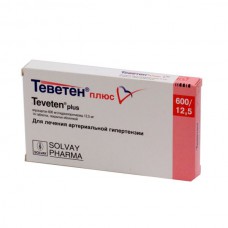Expiration date: 12/2026
The composition and form of issue:
Tablets, film-coated. 1 tablet contains:
eprosartan mesylate 735,8 mg
(corresponds to 600 mg of eprosartan)
hydrochlorothiazide 12.5 mg
excipients: MKC — 43,3 mg lactose monohydrate — 43,3 mg corn starch jelatinizirovanny — 43,3 mg crospovidon — 38,5 mg of magnesium stearate and 7.2 mg purified water is 50.9 mg
the shell: Opadry (OY3736) — 31 mg (hypromellose, macrogol 400, dyes: titanium dioxide E171, iron oxide black E172, iron oxide yellow E172)
blistere in 14 PCs. in cardboard pack 1, 2 or 4 blisters.
Description pharmaceutical form:
Tablets, film-coated, oval, biconvex, light yellow to yellow with brownish shade, marked "5147" on one side and "SOLVAY" on the other. In the cross-section are visible two layers.
Feature:
Combined anti-hypertensive agent (angiotensin II receptor blocker + diuretic).
Pharmacokinetics:
Eprosartan
After ingestion bioavailability of approximately 13%. Linking blood plasma proteins is high (98%) and remains constant throughout the therapeutic range of concentrations. The bonding with blood plasma proteins is not dependent on sex, age, liver function does not change with mild or moderate renal insufficiency, but is reduced in severe renal failure. Cmax of the drug is determined after 1-2 hours after ingestion. When taking eprosartan at the same time food is observed clinically relevant reduction of absorption (less than 25%), Cmax and AUC. The volume of distribution of 13 l, the Cl — 130 ml/min When administered is excreted mainly unchanged: Kal — 90% in urine and 7%. A small part (less than 2%) is excreted by the kidneys in the form of glucuronides. 20% of the concentration in the urine is acylglucuronide eprosartan, 80% is unchanged drug. Almost not koumouliruet. Body mass, sexual and racial differences do not affect the pharmacokinetics of eprosartan. In individuals under 18 years of age the pharmacokinetics of not been studied. The treatment with eprosartan in patients with moderate chronic kidney failure, Cl creatinine of 30 to 59 ml/min, AUC and Cmax 30%, and severe (creatinine Cl 5 to 29 ml/min), 50% higher than with healthy people. In hepatic insufficiency, the AUC (but not Cmax) increased on average by almost 40%. Of dosage adjustment in hepatic insufficiency and in the elderly is not required.
Hydrochlorothiazide
Hydrochlorothiazide is eliminated rapidly by the kidneys. At least 61% of the oral dose is eliminated unchanged within 24 h. Hydrochlorothiazide crosses the placental barrier, excreted in breast milk.
Teveten Plus
Concomitant administration of hydrochlorothiazide and eprosartan from the clinical point of view, has no meaningful impact on the pharmacokinetics of both components. Eating does not affect the bioavailability of eprosartan and hydrochlorothiazide, but retards their absorption. Tmax eprosartan plasma is 4 h after administration, Tmax of hydrochlorothiazide — 3 hours.
Description pharmacological action:
Eprosartan
Selectively acts on AT1-receptors located in the blood vessels, heart, kidneys and adrenal cortex, forming with them a strong relationship with subsequent slow dissociation. Prevents the development or reduces the effects of angiotensin II, inhibits the activity of the renin-angiotensin system. Reduces arterial vasoconstriction, PR, the pressure in the pulmonary circulation, and reabsorption of water and sodium in the proximal segment of the renal tubules, aldosterone secretion. Has vasodilating, hypotensive and mediated diuretic effect. Long-term use suppresses the proliferative effect of angiotensin II on the cells of smooth muscles of vessels and myocardium. Permanent antihypertensive effect persists for 24 hours without orthostatic hypotension and reflex tachycardia in response to the first dose. Provides renal protection effect, reducing the excretion of albumin, while preserving renal autoregulation, regardless of degree of renal failure. Has no effect on lipid, carbohydrate and purine metabolism. Upon termination of the treatment did not cause a syndrome "cancel". Eprosartan does not increase such effects, associated with bradykinin, mediated APF, such as cough.
Hydrochlorothiazide
Hydrochlorothiazide is a thiazide diuretic. Thiazides affect the mechanisms of reabsorption of electrolytes in renal tubules, increasing excretion of fluid, sodium and chlorine ions. Due to the diuretic action of hydrochlorothiazide reduces plasma volume, increases renin activity in plasma, increased aldosterone secretion, which leads to an increase loss of potassium and bicarbonate in the urine and decreased concentration of potassium in the blood serum. The mechanism of antihypertensive action of hydrochlorothiazide is combination diuretic and vascular effects.
Teveten Plus
In patients with elevated garden eprosartan provides a statistically significant decrease. The addition of a single daily dose (600 mg) eprosartan and 12.5 mg hydrochlorothiazide provided an additional statistically significant reduction of garden compared with a daily intake of only eprosartan. The combined introduction of eprosartan with hydrochlorothiazide reduces the loss of potassium associated with the diuretic effect. The start of diuresis occurs within the first 2 hours, and peak effect after 4 h. the Maximum antihypertensive effect usually develops after 2-3 weeks of treatment.
Indications:
Hypertension.
Contraindications:
- hypersensitivity to any component of the drug and sulfonamides
- pregnancy
- breastfeeding
- renal failure (Cl creatinine <30 ml/min)
- the age of 18 years (efficacy and safety not established).
With caution:
- severe heart failure III–IV (NYHA)
- bilateral renal artery stenosis, renal artery stenosis to a solitary kidney
- the decrease in BCC, dehydration, loss of electrolytes, treatment with high doses of diuretics, repeated vomiting, prolonged diarrhea, salt-free diet
- moderate or marked liver dysfunction
- diabetes.
Application of pregnancy and breast-feeding:
Contraindicated in pregnancy. At the time of treatment should stop breastfeeding.
Side effects:
The overall incidence of side effects, registered in patients receiving eprosartan, comparable to when receiving placebo. These actions, as a rule, were mild and short, so stopping it took only 4.1% of patients undergoing treatment with eprosartan during placebo-controlled clinical trials (6.5% of the group placebo).
CNS: rarely — headache, dizziness, weakness.
The skin: rarely — bystroprokhodaschee rash, pruritus, urticaria.
From the side of cardiovascular system: very rarely — decreased blood pressure, angioedema.
Hydrochlorothiazide did not increase the incidence of side effects. For the many years of experience in the application of hydrochlorothiazide in clinical practice were recorded following side effects:
gastrointestinal: anorexia, nausea, vomiting, diarrhea, constipation, jaundice, pancreatitis
from the nervous system: dizziness, weakness, paresthesia, asthenia, headache, anxiety
from the side of cardiovascular system: hypotension, orthostatic hypotension
from the hematopoietic and lymphatic systems: leukopenia, agranulocytosis, thrombocytopenia, aplastic and hemolytic anemia
in the kidneys: interstitial nephritis, renal failure
from the lungs: pneumonitis, pulmonary edema
from the leather side: bystroprokhodaschee rash, vasculitis, and toxic epidermal necrolysis, systemic lupus erythematosus
metabolism: hyperglycemia, hyperuricemia, gout, hyponatremia, hypokalemia, gipohloremia, hypercalcemia, hypomagnesemia, hypercholesterolemia, hypertriglyceridemia
other: seizures, sexual dysfunction, fever, anaphylactic reactions.
Drug interactions:
Hypotensive effect may be enhanced by concurrent use of other antihypertensives. When used in conjunction with oral hypoglycemic agents need to adjust their dose, because. hydrochlorothiazide may reduce tolerance to glucose. Can reversibly increase the concentration of lithium in plasma and increase the risk of its toxic effects (requires careful monitoring of lithium concentration in patients simultaneously receiving Teveten Plus and lithium). NSAIDs may reduce diuretic and hypotensive effect Teveten Plus. Reducing potassium levels, hydrochlorothiazide can increase the action of cardiac glycosides and some antiarrhythmic drugs. Hydrochlorothiazide increases the risk of hypokalemia when administered with drugs that cause the loss of body potassium, such as diuretics, with calibrations effect, laxatives, glyukokortikosteroidami and adrenocorticotropic hormone (ACTH). Hydrochlorothiazide may enhance the action of non-depolarizing muscle relaxants (e.g. tubocurarine). Absorption of hydrochlorothiazide is reduced when co-administered anion-exchange resins, such as colestipol or colestyramine.
Method of application and dose:
Inside, 1 tab. a day in the morning, regardless of the meal.
The selection of the dose Teveten Plus in elderly patients, patients with mild and moderate impaired hepatic function and patients with impaired renal function (Cl creatinine more than 30 ml/min) is required.
Overdose:
Data on overdose is currently no.
Symptoms: possible excessive reduction in blood pressure, dehydration and electrolyte imbalance (hypokalemia, gipohloremia, hyponatremia), manifested as nausea and drowsiness.
Treatment: depending on the time elapsed after ingestion, measures should include stimulation of vomiting, gastric lavage and/or administration of activated charcoal. With a sharp decrease in blood pressure, it is recommended to lay the patient on his back, legs raised, if necessary, enter the plasma-liquid. In the dehydration and violations of water-salt balance is recommended symptomatic and supportive therapy. Hemodialysis is ineffective.
Precautions:
Based on pharmacodynamic properties, Teveten Plus should not influence on ability to driving and use of machines and mechanisms. During treatment of hypertension must be careful when driving vehicles and occupation potentially hazardous activities, require high concentration and psychomotor speed reactions, due to the fact that there can be dizziness and weakness.
Special instructions:
Patients with impaired renal function. When treating patients vascular tone and renal function which is predominantly dependent on the activity of the renin-angiotensin-aldosterone system e.g. patients with severe congestive heart failure III–IV NYHA, with bilateral renal artery stenosis or stenosis of artery only kidneys, it is necessary to ensure careful monitoring of renal function. If, during the course of treatment, deterioration of renal function, treatment should be reconsidered. In patients with impaired renal function can take place azotemia associated with the use of hydrochlorothiazide.
Patients with impaired liver function. Hydrochlorothiazide should be used with caution in patients with moderate or severe liver dysfunction. While there is no clinical experience with the drug Teveten Plus in patients with severe liver damage.
Metabolic and endocrine effects. Hydrochlorothiazide may reduce tolerance to glucose, which may require dose adjustment of hypoglycemic agents patients with diabetes mellitus. During the course of treatment Teveten Plus might manifest latent diabetes. At the dose of hydrochlorothiazide 12.5 mg available in Teveten Plus, to date there has been little metabolic or endocrine effects.
Electrolyte imbalance. Hydrochlorothiazide can cause hypokalemia, hyponatremia, hypercalcemia, hypomagnesemia and alkalosis gipohloremichesky the. For all patients, receiving treatment dioretikami, it is necessary to provide periodic determination of serum electrolytes. Potassium-sparing diuretics, potassium supplements should be administered together with Teveten Plus with caution.
Symptomatic hypotension. With a decrease in BCC, dehydration or the decrease of electrolytes (such as during treatment with high doses of diuretics, repeated vomiting, prolonged diarrhea, and hypocolius salt-free diet), the drug can cause a sharp decrease in blood pressure (symptomatic hypotension). Before the appointment Teveten Plus such violations should be eliminated by correcting the sodium concentration in the blood and the deficit BCC. A transient decrease in blood pressure is not a cause of discontinuation of the drug, because in this case, AD stabiliziruemost further reception.



